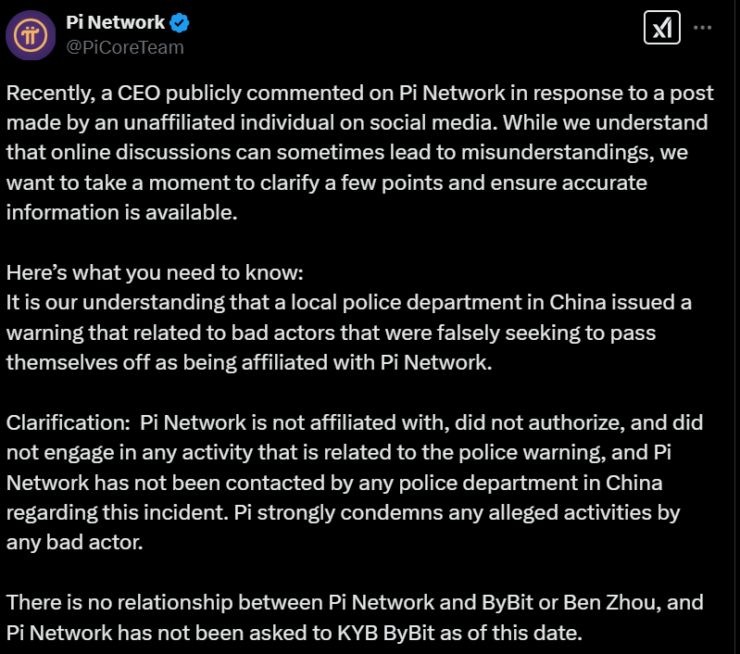Pi Network has been in the spotlight following its mainnet launch and recent comments from Bybit CEO Ben Zhou, who labeled Pi Coin a scam. In response, Pi Network has strongly refuted these claims, clarifying misconceptions surrounding the project. Since then, Pi Coin’s price has rebounded, surging 20% and now hovering around $0.77.
Bybit CEO’s Allegations Spark Controversy
The controversy stems from Ben Zhou’s statements, in which he referenced a 2023 warning from Chinese authorities that allegedly flagged Pi Network as a scam. The warning claimed that Pi Network was targeting elderly individuals, collecting their personal data, and ultimately causing financial losses, including their pensions.
Zhou’s comments intensified speculation around Pi Network’s legitimacy, fueling a sharp decline in Pi Coin’s value as panic selling took over. Additionally, Zhou dismissed rumors that Bybit had ever approached Pi Network for a potential listing or that Pi Network had declined Bybit’s listing request. According to him, Bybit never sought verification from Pi Network in the first place.
Pi Network Denies All Accusations
In response to these allegations, Pi Network issued a statement clarifying its stance and denying all claims of fraudulent activity. The project explained that the Chinese police warning referenced by Zhou was actually directed at scammers impersonating Pi Network rather than the official project itself.
Pi Network emphasized that it had no connection to these bad actors and was never contacted by the Chinese authorities regarding such issues. The team reaffirmed that it operates transparently and has no involvement in deceptive practices.

Furthermore, Pi Network dismissed claims of a relationship with Bybit or Ben Zhou, stating that they had never been approached for verification or business dealings. The project reiterated its commitment to creating a secure and decentralized blockchain ecosystem.
Six Years in Development, 60 Million Users Strong
Pi Network has been under development for six years, carefully building its infrastructure before a full-scale launch. The project has amassed a strong community of over 60 million users worldwide, many of whom have been actively mining Pi through its mobile-based system.
The project’s defenders argue that such a long development period is proof of its legitimacy rather than an indication of deception. They believe that Pi Network’s cautious approach ensures a smoother transition to mainnet adoption, reducing the risks typically associated with rushed token launches.
Pi Coin Surges 20% Following the Response
Following Pi Network’s defense against Zhou’s allegations, Pi Coin experienced a 20% price recovery, rebounding from the heavy selling pressure caused by the controversy. The token had initially dropped by 50%, with panic-driven sell-offs pushing its value down.
Since its mainnet launch, Pi Coin has been highly volatile. It initially traded at $1.50 but quickly suffered a steep 55% decline, reaching around $0.70. However, recent gains have lifted it back to approximately $0.77, reflecting a 14% increase from its recent low.
What’s Next for Pi Network?
Despite ongoing criticism, Pi Network continues to push forward with its development and adoption efforts. The project’s ability to weather controversies and regain investor confidence will play a crucial role in determining its future.
As Pi Coin stabilizes, the key question remains: Can Pi Network prove its legitimacy and establish itself as a serious player in the crypto space, or will skepticism continue to overshadow its progress? With millions of users backing the project, its next moves will be closely watched by both supporters and critics alike.





